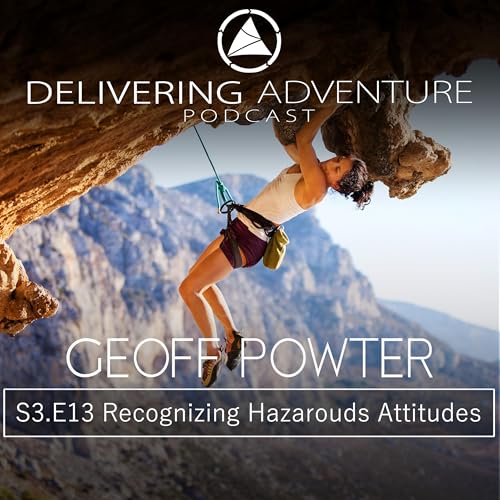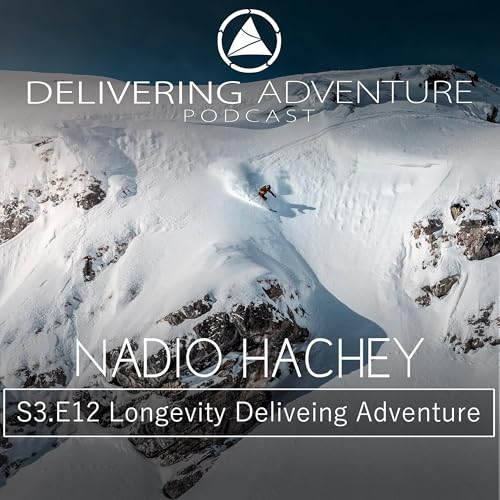How can we manage hazardous attitudes in ourselves and others?
The FAA in the US has identified five hazardous attitudes that are present in human caused airline crashes. These five attitudes are anti-authority, impulsivity, invulnerability, macho and resignation. These attitudes can negatively impact judgment in any risk-taking situation.
In this episode Geoff Powter shares how we can manage these hazardous attitudes in ourselves and others.
Geoff Powter is a retired psychologist, an experienced climber, writer, and adventurer from the Canadian Rockies. He served as editor of the Canadian Alpine Journal for 13 years and has won 9 National Magazine Awards.
Geoff has authored several books, including Strange and Dangerous Dreams, which won the Jury Prize at the 2006 Banff Mountain Book Festival and was adapted into a radio series. His second most recent book, Inner Ranges, won the Climbing Literature Prize at the Banff Festival in 2019 and the National Outdoor Book Award in the USA. His most recent book Survival Is Not Assured: The Life of Climber Jim Donini, is the Winner of National Outdoor Book Award in the USA.
This is the second episode of two where Geoff, Jordy and Chris explore the five hazardous attitudes that can impact decision making and risk taking.
Key Takeaways
How to manage hazardous attitudes in ourselves and others:
Anti-authority: Is the “do not tell me what to do,” mindset.
To manage this, recognize that rules, guidelines and best practices exist to help us and follow them! To manage it in others, explain the reason why rules exist, give people control when you can, and involve people in decision making as much as possible.
Impulsivity: Is the “do it quickly,” mindset.
To manage this, be methodical, follow all the steps, and slow things down when we feel the need to rush into things.
Also, make others aware of the risk of rushing into things and encourage them to follow systems and processes without skipping steps. This reduces the chance of errors and missing information. It also ensures everyone knows what to do.
Invulnerability: Is the “It won’t happen to me,” mindset
To manage this, remind yourself that bad outcomes can happen to anyone. For others, try to personalize the fact that bad outcomes can happen to anyone by highlighting mishaps that have happened to people they may know. This can include sharing your own stories of misadventure involving negative outcomes. This can help to make things more real.
Macho: This is the “I can do it,” mindset
To manage this, look for signs of overconfidence. Celebrate humility and model an objective approach to decision making that involves accepting that some things may be beyond our capabilities and that’s normal.
Resignation: This is the “what’s the use,” mindset.
To manage this, believe that you have the power to change or influence the situation you are in. Involve everyone in decision making and ensure everyone is heard. Acting on concerns or suggestions can also demonstrate to others that they do have the power to change their situation.
Guest Bio
Geoff is a retired psychologist, an experienced climber, writer, and adventurer from the Canadian Rockies. He served as editor of the Canadian Alpine Journal for 13 years and has won 9 National Magazine Awards.
Geoff has authored several books, including Strange and Dangerous Dreams, which won the Jury Prize at the 2006 Banff Mountain Book Festival and was adapted into a radio series. His second most recent book, Inner Ranges, won the Climbing Literature Prize at the Banff Festival in 2019 and the National Outdoor Book Award in the USA. His most recent book Survival Is Not Assured: The Life of Climber Jim Donini, is the Winner of National Outdoor Book Award in the USA.
In 2012 Geoff was the recipient of the Summit
 1 h y 4 m
1 h y 4 m 1 h y 7 m
1 h y 7 m 1 h y 14 m
1 h y 14 m 1 h y 4 m
1 h y 4 m 1 h y 1 m
1 h y 1 m Nov 18 20251 h y 3 m
Nov 18 20251 h y 3 m 26 m
26 m 56 m
56 m
